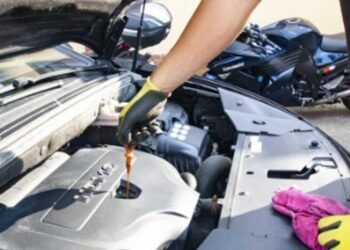As a commercial truck owner or fleet manager, ensuring the longevity of your vehicles is crucial for maximizing profitability and minimizing downtime.
This is why truck dealerships make more money from maintenance services than from selling vehicles. More money for dealerships and more saved time and money for you as a truck owner. In this blog post, we will discuss effective strategies and essential tips to help you extend the lifespan of your commercial truck.
1. Implement a Regular Maintenance Schedule
A proactive and consistent maintenance schedule is the foundation for keeping your commercial truck in excellent condition. Develop a maintenance checklist that includes tasks such as oil changes, filter replacements, tire rotations, brake inspections, and fluid checks. Adhere to the manufacturer’s recommended service intervals and track all maintenance activities for each vehicle in your fleet.
2. Prioritize Fluid Checks and Replacements
Regularly checking and replacing fluids in your commercial truck is vital for optimal performance and longevity. Services like engine oil, transmission fluid, coolant, power steering fluid, and brake fluid are necessary to do at every maintenance appointment at your local truck repair shop. Monitor fluid levels, quality, and follow the recommended replacement intervals. Neglecting fluid maintenance can lead to accelerated wear and tear on critical components.
3. Optimize Driving and Operating Habits
The way you drive and operate your commercial truck can have a significant impact on its lifespan. Encourage drivers to follow best practices such as avoiding aggressive acceleration and braking, maintaining consistent speeds, and avoiding excessive idling. Additionally, instruct drivers to adhere to recommended weight limits and avoid overloading the truck, as it puts undue stress on the vehicle’s components.
4. Regularly Inspect and Maintain the Braking System
The braking system plays a crucial role in the safety and longevity of your commercial truck. Replace worn-out brake components promptly to avoid damage to other parts of the system. Train your drivers to listen for unusual noises or vibrations while braking, as these may indicate potential issues that require immediate attention.
5. Keep the Engine in Optimal Condition
The engine is the heart of your commercial truck, and proper maintenance is key to extending its lifespan. Regularly change the oil and oil filter to prevent engine sludge buildup. Follow the manufacturer’s recommendations for air filter replacements to maintain optimal air intake. Keep an eye on warning signs such as unusual noises, excessive smoke, or decreased performance, as these may indicate underlying engine problems that require professional inspection.
6. Pay Attention to Tire Maintenance
Proper tire maintenance is crucial for safety, fuel efficiency, and truck longevity. Regularly inspect tire pressure, tread depth, and overall tire condition. Under-inflated or overinflated tires can result in uneven wear and reduced fuel efficiency. Rotate tires at recommended intervals to ensure even tread wear. Replace worn-out tires promptly to avoid compromising traction and stability.
7. Address Issues Promptly
Timely attention to any warning signs or issues that arise is vital for preventing small problems from turning into major breakdowns. Train your drivers to report any unusual sounds, vibrations, leaks, or dashboard warning lights promptly.
One often overlooked aspect of commercial truck maintenance that holds significant importance is truck wheel alignment. Proper wheel alignment ensures that the wheels are angled correctly and in alignment with each other and the vehicle’s frame. This seemingly minor adjustment plays a crucial role in maximizing stability, tire wear, and overall vehicle performance.
When the wheels are properly aligned, the truck experiences even weight distribution, reducing unnecessary strain on specific components. This balance helps prevent premature wear and tear on tires, suspension systems, and steering components. On the other hand, misaligned wheels can lead to uneven tire wear, decreased fuel efficiency, and compromised handling.
To maintain proper wheel alignment, it is essential to schedule regular alignment checks, especially after incidents such as hitting curbs, potholes, or other road hazards. Work closely with a trusted truck repair shop that has the expertise and specialized equipment to accurately assess and adjust your commercial truck’s wheel alignment.
Conclusion
In the pursuit of extending the lifespan of your commercial truck, every maintenance aspect matters. Proper wheel alignment should be a key focus in your maintenance strategy, as it directly influences stability, tire wear, and overall performance. By scheduling regular alignment checks and promptly addressing any misalignment, you can prevent premature wear, improve fuel efficiency, and enhance the overall lifespan of your truck.
Remember, investing in proactive care and maintenance practices not only helps you save time, money, and headaches in the long run but also ensures that your commercial truck fleet operates at its best. Embrace these strategies, including regular maintenance schedules, fluid checks, optimized driving habits, prompt issue resolution, and proper wheel alignment, to unlock the full potential of your commercial trucks and enjoy their reliable performance for years to come.












